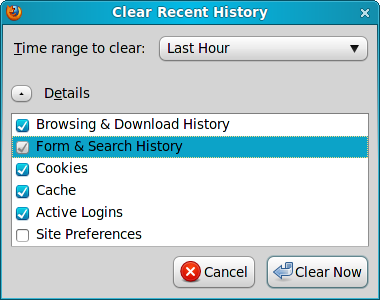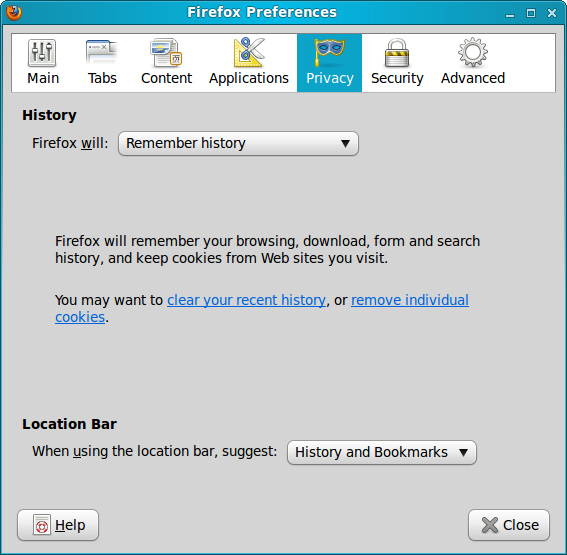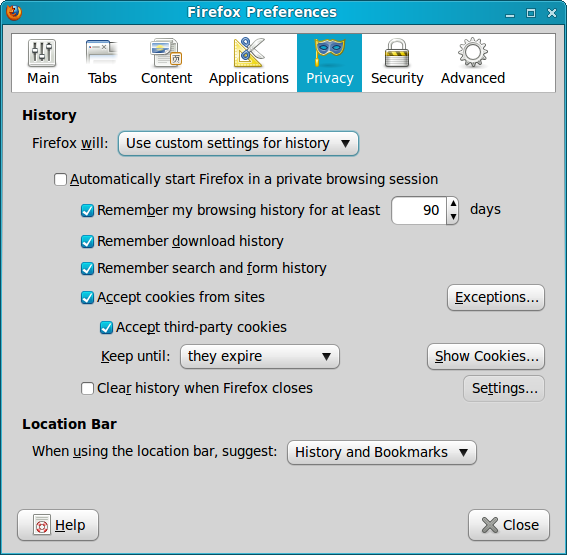Privacy in Firefox
To improve your experience on the internet, Firefox stores a collection of data relevant to the sites you visit. For example, Firefox may store the following information as you browse:
- Visited page history: This allows you to go back to sites you've visited, find them using the Smart Location Bar and see them in both the History menu, History sidebar and library window.
- Form and Search Bar entries: This remembers what you've filled out in the search bar and on forms on pages to make filling the same forms and performing the same searches easier.
- Logins and passwords: This makes it easier to log in to frequently visited sites. Firefox will never store these without asking.
- Download list: This helps you find files you previously downloaded.
- Cookies: Cookies are small bits of information that sites use to save site preferences and sessions so they can identify you between visits (and remember things like your shopping cart or keep you logged in).
- Web cache: A cache stores pages and other web content that you've already seen so that Firefox can use the stored content rather than having to download it again, greatly speeding up browsing and reducing demands on web servers. By default, this is not stored for secure (https) websites to avoid retaining secure data.
- Browsing sessions: This allows Firefox to restore the tabs you had open when you start it or after a crash.
Private Browsing
Firefox 3.6 and later have a feature called Private Browsing where none of the above information is saved until Private Browsing is turned off.
Starting Private Browsing session:
- Click on the Tools menu and select Start Private Browsing.
- The first time you turn on Private Browsing, Firefox will alert you that it will save your current windows and tabs for after you finish using Private Browsing. Click on Start Private Browsing to continue.
- You will then enter Private Browsing mode, and the Private Browsing information screen will appear.
-
When browsing in Private Browsing mode, the Firefox window title will show (Private Browsing) during your session.
Clearing Your History
Firefox allows you to clear some or all of your browsing history. This will delete information from your profile and from disk that could be used to identify your activities online.

Clearing Firefox History:
- Click on Tools > Clear Recent History.
- Firefox will display the Clear Recent History dialog, with a drop-down menu for the time period to clear. You can choose between the last hour and all saved history.
- If you only wish to delete some of your history, such as the information stored for forms or in search history, click Details. This will open a list of items stored by Firefox, such as Cookies, Cache, and Form & Search History.
- Once you have selected the information you wish to delete, click Clear Now. Note that this cannot be undone.
Privacy Preferences
You can tell Firefox what type of information you'd like stored, and even default to saving no browsing history at all.

- To configure these settings go to Edit > Preferences on Windows or Linux, or Firefox > Preferences on Mac OS X.
- From the Dropdown menu, select from Remember history, Never remember history, or Use custom settings for history.
- If you've chosen Use custom settings for history, you can define the privacy settings you prefer. This will give very fine-grained control over privacy settings. You can also tell Firefox to always start in a private browsing session if you don't want to ever save browsing information.

-
You can specify how long Firefox will remember your browsing history. The default is 90 days, but it can be changed to any value.
- You can define whether the location bar will suggest from your browsing history and/or bookmarks. Choose from the dropdown menu next to Location Bar in the dialog.
- Once the preferences are to your liking, click Close.





